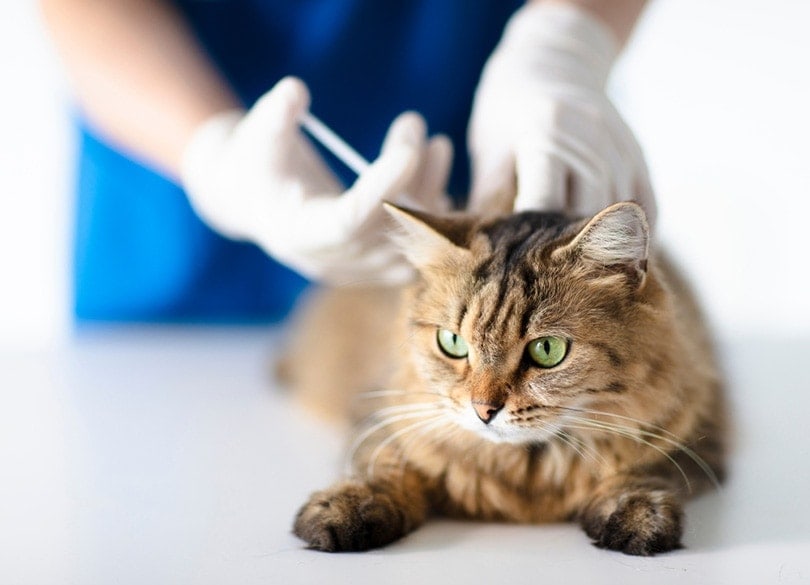Aspirin for Cats with Arthritis: Important Precautions (Vet Answer)

Updated on

Click to Skip Ahead
The advancement of medicine and healthcare for the domestic feline population has led to an overall increase in their expected lifespans. While this is generally a good thing, there are side effects of extended longevity. For example, it is now estimated that 90% of all cats over 10 years old and 45% of cats in general suffer from arthritis to some degree. If you suspect that your cat is suffering from arthritis and they are showing signs of discomfort, you may be wondering if you can give them aspirin.
While it is technically safe to give aspirin to a cat, you should always consult your veterinarian before giving aspirin or any other pain relief medication to a pet. Dogs and cats are not mini humans, and their bodies react to medications in entirely different ways. In fact, cats are particularly sensitive to many medications commonly found in a household’s medicine cabinet, aspirin being one of them.
What Is Aspirin?
Aspirin is a common over-the-counter drug that belongs to the nonsteroidal anti-inflammatory (NSAID) class of drugs. It is used therapeutically to treat pain and inflammation and sometimes, at a low dose, to prevent blood clot formation. It essentially helps prevent the inflammatory cascade in the body. However, it has a few undesirable side effects and is currently not the first choice of medication that veterinarians turn to for pain management in cats. Other medications on the market are safer and more effective.

Is Aspirin Safe to Use in Cats?
Cats eliminate aspirin from their bodies very slowly. Compared to dogs, the recommended doses to be given to cats are two to four times lower and at a frequency of four to six times longer. It is essentially easy to overdose on aspirin, and you need to follow veterinary instructions carefully. Also, you’ll have to ensure that it won’t react with any other drugs that your cat may be on. For example, aspirin must not be used with any other NSAIDs (such as Metacam or Rimadyl) or steroids (such as prednisone), as this increases the risk of stomach ulceration and other adverse effects. Certain heart medications promote the activity of aspirin, which could lead to aspirin toxicity.
This is why we never recommend giving your cat an over-the-counter human drug and why medications are usually only recommended on the advice of your veterinarian. It’s best to avoid any serious side effects that your cat could experience, especially ones that could be fatal.
What Are the Side Effects of Aspirin in Cats?
Side effects are possible with any NSAID drug, including aspirin. These include gastrointestinal signs like nausea, vomiting, inappetence, and more severely, gastrointestinal ulceration and bleeding. This will cause characteristically black tarry stools and vomit that may look like coffee grounds. If there are any changes to your cat’s feces while they are taking aspirin or they are sick, seek advice from your vet about whether to continue the medication.
Your vet will also not give aspirin to a cat if they have certain underlying medical conditions, such as kidney disease. In one of its many actions on the body, aspirin reduces blood flow to the kidneys, especially in patients that already have poor renal function, and has the potential to cause injury to these organs.

What Is Aspirin Toxicity?
Aspirin belongs to a class of chemicals called “salicylates,” all of which can cause toxicity. Salicylates are in many products, including hair and skin products, sunscreen, and pain creams. Unfortunately, aspirin overdose can result from a single dose of medication given with the best intentions, so it is fundamentally important that you double-check the amount that you should be giving your cat.
- Gastrointestinal irritation and/or bleeding
- Diarrhea
- Pale gums
- Weakness
- Depression
- Fever
- Tremors
- Increased respiratory rate
- Seizures
- Coma
- Death
Currently, there is no specific antidote for aspirin toxicity, so treatment is what is called “supportive.” Depending on when the aspirin was given, the vet can induce vomiting to stop further absorption by the stomach and give the cat activated charcoal to neutralize any aspirin that has made its way farther down the gastrointestinal tract. Your cat may need to be hospitalized on an IV fluid drip and given extra medication for organ function support, depending on their clinical signs and bloodwork. Unfortunately, the liver and kidneys may be compromised in the long term.
The 4 Alternative Pain Relief Options for Cats
Numerous medications can be given to cats suffering from arthritis, which you will be able to acquire after consultation with your veterinarian.
1. Other NSAIDs
Other NSAIDs are safer to use in cats, including drugs like meloxicam and robenacoxib. However, with the long-term use of these drugs, you’ll need to monitor your cat for gastrointestinal signs and renal disease.
2. Solensia
There are new and exciting treatments for dogs and cats with arthritis, including the use of monoclonal antibodies to target a protein responsible for the pain pathway in arthritic cats. In 70% of cases, Solensia is shown to improve a cat’s pain scores and entails monthly injections by a veterinarian.

3. Adjunctive Medications
Reserved for more severe cases of arthritis, pain relief like gabapentin and tramadol can be used to provide further pain management. These are usually combined with NSAIDs.
4. Other Therapies
Numerous adjunctive therapies and lifestyle factors can help cats with arthritis. These include rehabilitation (such as deep muscle massage, acupuncture, and physiotherapy), weight and dietary management (including supplementation with essential fatty acids), and encouragement to exercise to maintain muscle mass.
Conclusion
If you feel that your cat is suffering from arthritis, you should book a visit with your veterinarian. Many felines go undiagnosed because the signs of arthritis can be subtle in cats, meaning the disease is often advanced before owners seek veterinary attention.
When it comes to pain relief, many other better and safer medications have pushed back the use of aspirin, and in any case, it is not recommended to give your cat any medicine without the guidance of your vet.
- Is your cat jumping onto and off surfaces normally?
- Is your cat climbing up and down stairs normally?
- Is your cat running normally?
- Is your cat chasing moving objects, such as toys or prey?
- Has there been any change to their demeanor or activity levels recently?
If you answer yes to any of these questions, you should take your cat to the vet as soon as possible.
Featured Image Credit: imaginariumau, Shutterstock














